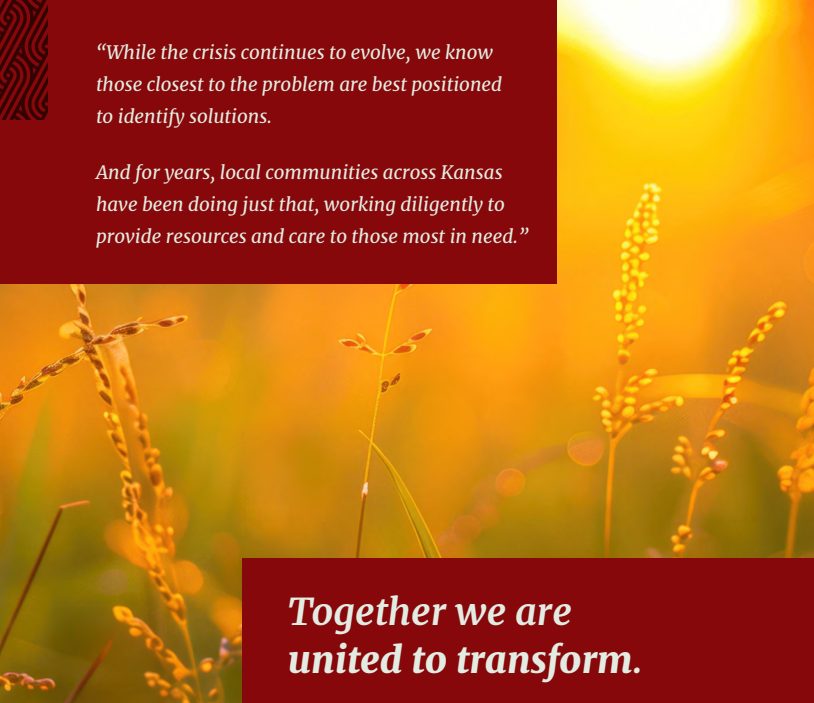Imagine Shawnee County as a community garden. Some plots are lush and thriving, while others are dry, weedy, or barely sprouting. The “United to Transform 2025 Needs Assessment” is like a master gardener’s blueprint—it maps where the soil is depleted, where more tools are needed, and where roots are shallow.
One of the most striking findings is this:
“The extent of substance use disorders in Kansas exceeds our prior understanding (NSDUH, 2023). Nearly one in five adults (395,000) meet DSM-5 clinical criteria for SUD. Among young adults, that number jumps to 29%. Tragically, 95% of those meeting the criteria do not feel they need treatment or other support.”
That means in Shawnee County, where you see a group of friends at a high school game or a crowded room at a local event, the chances are high that someone there is quietly struggling. And almost all of them don’t think help is possible—or needed.
What the Assessment Found
- Access is scarce: Less than 1% of Kansans with SUD get inpatient detox; fewer than 4% get medication-assisted treatment.
- Funding is fragile: Most grants last only a year, making it hard to sustain care.
- Pharmacies are untapped allies: Naloxone is available, but reimbursement is spotty.
- Hope is growing: Stigma is easing, and more people are open to working in SUD care.
What the Blueprint Recommends
- Grow the workforce—pay, training, and peer support to stabilize those helping.
- Expand access—to detox, medications for opioid use disorder (MOUD), and naloxone.
- Increase collaboration—require cross-sector work and host community networking.
- Track progress—with shared data systems.
- Tell the stories—to fight stigma and build public will.
Where SENT Inc. Fits In: The Gardeners in Hi-Crest
SENT is already tending the soil in Southeast Topeka:
- SUD services: assessments, counseling, relapse prevention, and long-term support.
- Awareness campaigns: from Dry January to Opioid Awareness Month, SENT keeps the conversation visible. SENT also leads a year-long campaign with different monthly themes, producing 12 personal story videos as part of the series. Through the first six months of 2025, the campaign reached over 2.3 million people across platforms, engaged more than 624,000 individuals directly, added nearly 900 new followers, and drove thousands of clicks to SENT’s website—showing measurable results in both reach and engagement.
- Wraparound care: food security through the Southside Filling Station, housing, case management, education partnerships, holistic mental health services, and physical healthcare which includes developing a line of herbal medications to serve as an alternative to some opioids on the market to aid in recovery efforts. SENT also offers access to chiropractic services and massage therapy to help neighbors manage pain as part of SUD treatment.
- Direct access to MOUD and naloxone (not detox): offered through SENT’s behavioral health and SUD services, providing assessments, counseling, relapse prevention, and long-term care.
SENT’s presence in schools and neighborhoods means it is already doing what the report calls for—being rooted locally, combining prevention with treatment, and reducing stigma with real stories of hope.
The Takeaway for Shawnee County
The Needs Assessment is a blueprint for a resilience garden—it shows where nutrients (services, funding, collaboration) are missing across Kansas. SENT Inc. are the garden keepers—already working the soil in Hi-Crest to help families thrive.
When we line up the blueprint with the boots-on-the-ground gardeners, Shawnee County can become a place where more people get the treatment they need, where prevention takes root, and where the stigma of asking for help is finally pulled up by the roots.
|
Latest news on Kansas Fights Addiction
August 26, 2025
|
|
Findings on Kansas Fights Addiction needs assessment now available
|
|
| Using the findings of the recently released comprehensive, statewide needs assessment of substance use disorder systems (SUD) and related work in Kansas, the Kansas Fights Addiction Grant Review Board is looking forward to developing strategies and schedules for future funding opportunities.
The needs assessment project – initiated by Sunflower Foundation, funded by the KFA board, and conducted by the University of Kansas Center for Public Partnerships and Research (KU-CPPR) – aimed to gain a better understanding of SUD system needs to further reduce substance abuse and addiction, save lives, and improve systems of care. The full report is available on the project website, United to Transform.
The website features findings and tools developed by KU-CPPR that are available for communities. This includes the full needs assessment report, associated appendices, an interactive map, and county-level data profiles. The map provides community leaders with a visualization of information gathered in the project and aids in community planning efforts. The downloadable county profiles highlight key risk and protective factors that influence substance use. These factors, and others, combine to create a county vulnerability index, which is further detailed in the report.
Informed by the voices of more than 2,000 Kansans, the project brings together a wide range of data, insights from people with lived and professional experience, and information about services, funding and outcomes to form a clear, detailed picture of the SUD landscape. The KFA board and Sunflower Foundation thank KU-CPPR for the work and experience they brought to the project.
Information about future KFA funding opportunities will be shared through this mailing list.
Click below to learn more about KFA and the needs assessment. |
|



